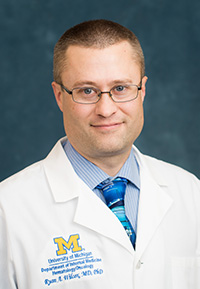May 7, 2019:
The University of Michigan is leading a Big Ten Cancer Research Consortium study that will test the immunotherapy drug nivolumab combined with the anti-CSF-1R monoclonal antibody cabiralizumab in patients with relapsed or refractory peripheral T cell lymphoma (PTCL). The study is now open for accrual at the University of Michigan Rogel Cancer Center.
The study, BTCRC-HEM16-085, “Phase II study of nivolumab and the antagonistic CSF-1R monoclonal antibody cabiralizumab (BMS-986227) in patients with relapsed/refractory peripheral T cell lymphoma,” will help researchers determine the number of patients whose tumors shrank after receiving this therapy, and how long this response lasts before the tumors start to grow again. Researchers also hope to learn more about the safety of this combination.
PTCL is a type of non-Hodgkin lymphoma that develops from T-cells, a type of white blood cell that plays a central role in the body’s immune response. More than 74,000 new cases of non-Hodgkin lymphoma were estimated for 2018, 10 to 15 percent of which are PTCL. Because of the heterogeneity of these lymphomas and lack of understanding regarding their pathogenesis, classifying PTCL and developing new therapeutic strategies is slow and challenging.
“While there are a number of novel agents that are FDA approved, the response rates with those agents are low, on the order of about one third, so one in three patients may anticipate a response with those agents,” said Ryan A. Wilcox, MD, PhD, sponsor-investigator of the study and a medical oncologist at the University of Michigan Rogel Cancer Center.
Dr. Wilcox explained that overall survival rate at the time of relapse is less than six months, so T-cell lymphomas greatly need to be addressed.
People with PTCL who are not enrolled in a clinical trial can be treated with chemotherapy, radiation therapy, hematopoietic stem cell transplant (HSCT), steroid therapy, or combinations of these treatments.
In this study, all participants will receive the same treatment in units of time called cycles. One cycle lasts 14 days. The cycles will repeat until the subject’s disease worsens or they experience severe side effects. For subjects who experience a complete response, the study drugs will be stopped after 6 months of complete response. Nivolumab and cabiralizumab will be administered intravenously with infusions lasting 30 minutes each. There will be a 30-minute observation period between the infusions.
Colony-stimulating factor 1 receptor (CSF1R) is a cytokine or protein which controls the production, differentiation, and function of macrophages. High levels of tumor associated macrophages (TAMs) can support tumor progression by suppressing T cell functions.
Cabiralizumab is a drug that blocks macrophages and monocytes, types of immune cells that proliferate in many diseases. Investigators believe that macrophages are responsible for preventing the body from fighting cancer cells. Preliminary lab tests demonstrate that blocking macrophages and monocytes help activate an immune response against cancer cells.
Nivolumab is a monoclonal antibody that stimulates a body’s immune system to fight cancer cells. Under normal circumstances, T cells in a human body help the immune system fight infections and diseases. However, some cancer cells can hide from T cells by taking over a pathway called PD-1. Nivolumab is designed to block the PD-1 pathway by binding to it, so the immune system can recognize and kill cancer cells.
Nivolumab is approved by the U.S. Food and Drug Administration (FDA) to treat several cancers, including certain types of Hodgkin lymphoma, melanoma, lung, colorectal, liver, bladder, head and neck, and kidney cancers. Cabiralizumab has not been approved by the FDA to treat any disease. The combination of nivolumab and cabiralizumab is not FDA-approved and should be considered investigational.
Blood and tissue samples will be collected to support correlative research. Correlative studies are used to find relationships between biomarkers (such as genes and proteins) and clinical outcomes (such as disease progression).
Up to 33 subjects may participate in this clinical trial. To qualify for the study, participants must be adults age 18 or older with peripheral T cell lymphoma, whose disease has either relapsed or did not respond to prior treatment.
The study is supported by Bristol-Myers Squibb.
For more information about this research study, including full eligibility requirements, visit www.clinicaltrials.gov (study #NCT03927105).
About the Big Ten Cancer Research Consortium: The Big Ten Cancer Research Consortium was created in 2013 to transform the conduct of cancer research through collaborative, hypothesis-driven, highly translational oncology trials that leverage the scientific and clinical expertise of Big Ten universities. The goal of the Big Ten Cancer Research Consortium is to create a unique team-research culture to drive science rapidly from ideas to new approaches to cancer treatment. Within this innovative environment, today’s research leaders collaborate with and mentor the research leaders of tomorrow with the unified goal of improving the lives of all patients with cancer.
About the Big Ten Conference: The Big Ten Conference is an association of world-class universities whose member institutions share a common mission of research, graduate, professional and undergraduate teaching and public service. Founded in 1896, the Big Ten has sustained a comprehensive set of shared practices and policies that enforce the priority of academics in the lives of students competing in intercollegiate athletics and emphasize the values of integrity, fairness and competitiveness. The broad-based programs of the 14 Big Ten institutions will provide over $200 million in direct financial support to almost 9,500 students for more than 11,000 participation opportunities on 350 teams in 42 different sports. The Big Ten sponsors 28 official conference sports, 14 for men and 14 for women, including the addition of men’s ice hockey and men’s and women’s lacrosse since 2013. For more information, visit www.bigten.org.















Subscribe to the Big Ten CRC Newsletter X
X Facebook
Facebook YouTube
YouTube